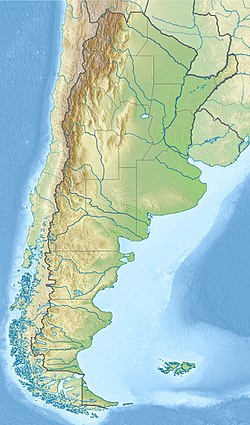Top Qs
Timeline
Chat
Perspective
Plottier Formation
Geologic formation in Argentina From Wikipedia, the free encyclopedia
Remove ads
The Plottier Formation is a geologic formation that outcrops in the Argentine Patagonian provinces of Río Negro and Neuquén. It is the younger of two formations belonging to the Río Neuquén Subgroup within the Neuquén Group of the Neuquén Basin, with the oldest rocks dating from the late Coniacian and its youngest maybe from the very start of the Santonian. Formerly, that subgroup was treated as a formation, and the Plottier Formation was known as the Plottier Member.[1]
Remove ads
Description
A section near the Neuquén City airport, north of the town of Plottier, is the type locality of the Plottier Formation.[2] At its base, this formation grades into the Portezuelo Formation, and it is in turn overlain conformably by the Bajo de la Carpa Formation, a unit of the Río Colorado Subgroup.
The Plottier Formation is the thinnest formation within the Neuquén Group, with a maximum thickness of only 25 metres (82 ft). It is differentiated from the underlying Portezuelo Formation primarily by its higher content of argillites (mud deposits) and was deposited under fluvial conditions. In 2006, a detailed lithostratigraphic and paleoecological study of a section of the Plottier Formation was published. This section contained alluvial deposits laid down by what was essentially a low-gradient wandering river throughout the millions of years, but often was of a single-channel type with little meandering.[3][1]
Remove ads
Fossil content
Summarize
Perspective
Color key
|
Notes Uncertain or tentative taxa are in small text; |
Few animal fossils are known from this formation, including:[4]
Crocodyliformes
Dinosaurs
Ornithischians
A footprint track of an ornithopod is known from the Middle Loma de la Lata site.[10]
Sauropods
12 footprint tracks of a sauropod are known from the site of Proyecto Dino.[10]
Theropods
Pterosaurs
Turtles
Ichnofossils
There are also ichnofossils left on the river's mudflats, as well as fossil freshwater bivalves.[1]
Ostracods
Plants
Remove ads
See also
References
Wikiwand - on
Seamless Wikipedia browsing. On steroids.
Remove ads





